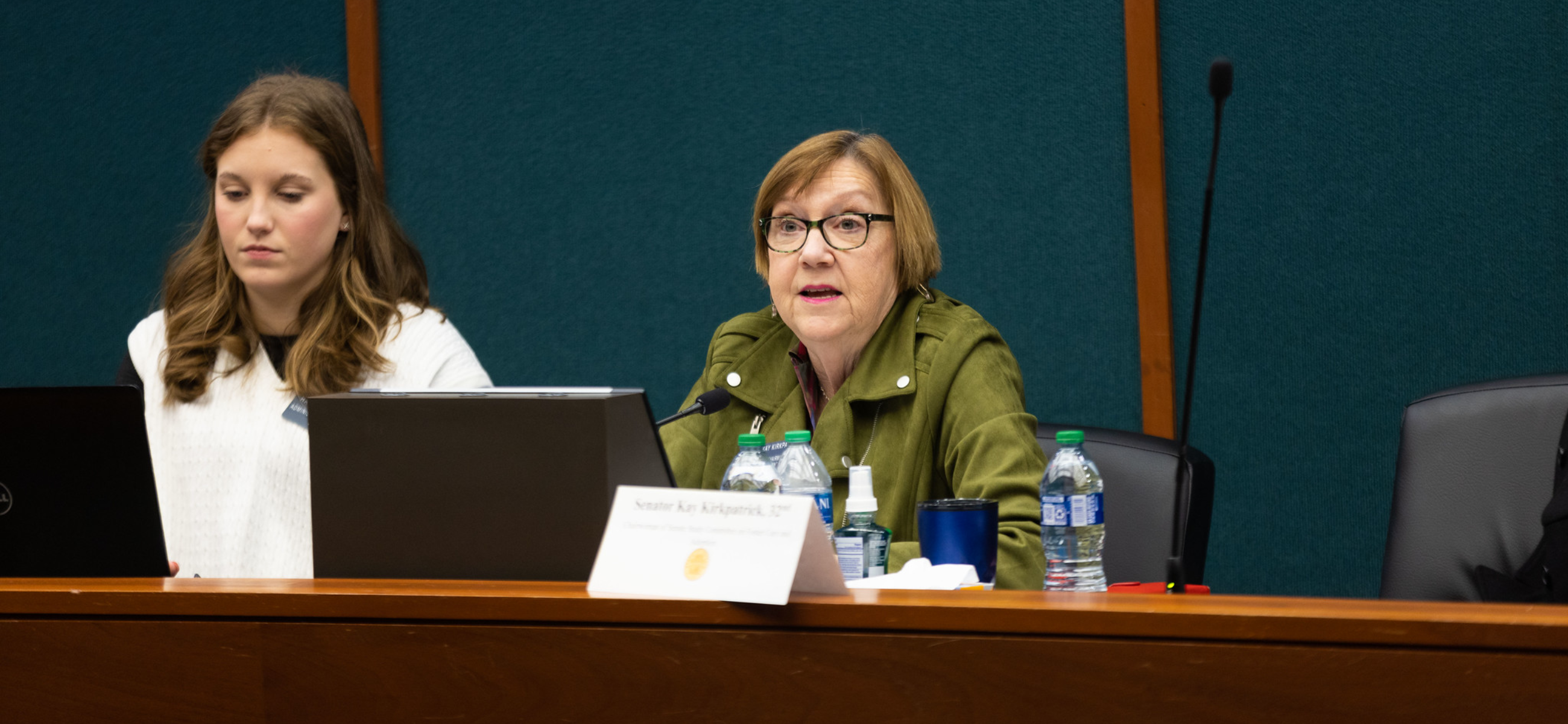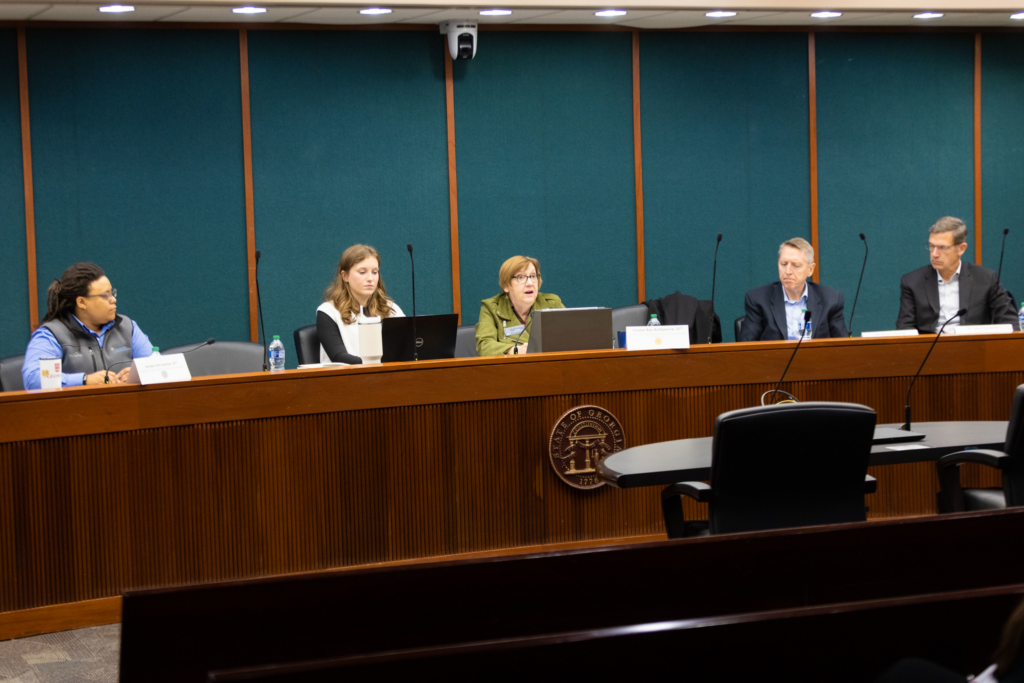Stay ahead of the curve as a political insider with deep policy analysis, daily briefings and policy-shaping tools.
Request a DemoLawmakers offer fixes for Georgia’s foster care, adoption system

Kay Kirkpatrick chairs the Senate Study Committee on Foster Care and Adoption. (Credit: Georgia Senate)
The Gist
Georgia’s Senate Study Committee on Foster Care and Adoption on Monday approved recommendations for addressing problems within the child welfare system.
The recommendations are a mix of proposed legislation, budget matters within various agencies that do not need intervention from the Legislature, and other remedies, said Sen. Kay Kirkpatrick, R-North-Central Cobb and West Cherokee, and chair of the committee.
“I think we did great work. And we’ve got a pretty good handle on the status of things here in Georgia right now, and we’ve got some very straightforward, specific things we can do to make things better,” Kirkpatrick told State Affairs. “ So I think everybody’s very happy with how things ended up.”
The committee had a Dec. 1 deadline to complete its work and submit recommendations to the Legislature.
What’s Happening

The nine-member study committee was formed to look into current policies and regulations dealing with conditions, needs, issues and problems related to the safety and welfare of Georgia’s children.
The committee has met since August, holding hearings in different parts of the state to get a sense of the issues.
“We got a lot of information that was not common knowledge to the committee,” Kirkpatrick said. “And it’s really just a matter of slicing and dicing all of it and trying to put it into something concrete that we could act on. So that’s kind of what we have been working on.”
The committee offered the following seven recommendations:
- Permanency. Getting foster kids into a permanent setup, whether through rejoining their family or adoption. There are existing statutory reporting requirements in the juvenile court system, but there are data limitations due to a lack of a uniform statewide reporting system. The committee suggests legislation to create a uniform reporting system, reportable to the Georgia General Assembly.
- State Identification Cards. Children in foster care currently have a hard time getting state photo IDs. That, in turn, makes it tough for foster children to be able to drive and get jobs. The committee recommends legislation to provide free, easily obtainable state photo IDs to foster children.
- Case Manager Retention. High turnover among the Department of Human Services’ Division of Family & Children Services case managers and other child placement agencies, is a problem. Possible solutions: more pay, training (including trauma-informed care) and resources to connect to nongovernmental groups that provide services to at-risk families and children. Contracting with a closed-loop referral tracking system will help case managers looking for community resources.
- Legitimation. Becoming the legal father of a child in Georgia is cumbersome. The committee recommends legislation to streamline the legitimation process, with protections for victims of domestic violence.
- Expanding Infant-Toddler Courts. Georgia is using Infant-Toddler Courts due to its success in other states. These courts focus on comprehensive support of at-risk families with infants and toddlers, promote successful reunification and feature enhanced attention to unmet mental health needs of parents whenever necessary. Expanding the courts in Georgia could prevent many children from entering or returning to the foster care system.
- Retaining foster and adoptive parents. Many foster parents leave the system due to redundant paperwork and other process issues. A significant proportion of foster and adoptive placements dissolve because of inadequate support to manage formidable mental health challenges of the children. Many of these issues could be handled by the state’s Department of Human Services without legislation because they relate to laws that already exist. The committee recommends: expanding access to training for foster and adoptive parents in trauma-informed care; having all future annual compliance appraisals mandated by the 2022 Georgia Mental Health Parity Act include a separate analysis that exclusively considers the state’s foster and adoptive children; foster and adoptive parents have access to mental health services when needed.
- Adoption assistance rates. The current recurring and one-time adoption assistance rates have not been adjusted since 2009. They need to be adjusted, the committee said.
In addition to those remedies, the committee also suggested strengthening residential treatment options for foster kids with complex needs, as part of the larger conversation in Georgia on mental health and substance use as well as using the Uniform Unregulated Child Custody Transfer Act to protect children who are crossing state lines. This would help with human trafficking issues.
Finally, the committee suggests expanding the Handle with Care program used by some law enforcement agencies to notify schools when a student has been involved in a traumatic event.
Why It Matters
The committee’s recommendations come at a crucial time.
Georgia has about 10,000 children in its foster care system, which has come under federal scrutiny this year after complaints emerged of abuse and neglect. At the same time, the number of people willing to be adoptive parents has dropped significantly since the pandemic.
The Georgia Department of Family and Children Services had systemwide breakdowns that showed case workers weren’t adequately responding to child abuse cases and that placement services for victims of human trafficking were’t appropriate, an investigation by the Georgia Office of the Child Advocate found.
U.S. Sen. Jon Ossoff, chairman of the Senate Human Rights Subcommittee, has held two hearings this year on the allegations.
What’s Next?
The recommendations will go to the Georgia General Assembly when it reconvenes in January. The committee as well as the standing Senate Committee on Children and Families will continue working on foster care and adoption issues during the upcoming session and beyond.
“There’s a lot of work left to do but we’ve got a path forward,” Kirkpatrick said.
RELATED:
Senate study committee hears suggestions to improve Georgia foster care
Have questions? Contact Tammy Joyner on X @lvjoyner or at [email protected].
And subscribe to State Affairs so you do not miss an update.
X @StateAffairsGA
Facebook @StateAffairsGA
Instagram @StateAffairsGA
LinkedIn @StateAffairs
Professionals still face licensing delays amid state’s transition to online system
The Gist Georgia’s professionals and business owners are still struggling to obtain professional licenses in a timely manner. As the Secretary of State’s Office rolls out its new Georgia Online Application Licensing System to expedite the process, the efficiency of this new process is being put to the test. What’s Happening Thursday morning at the …
Controversy over AP African American Studies class grows
Rashad Brown has been teaching Advanced Placement African American Studies at Atlanta’s Maynard Jackson High School for three years. He’ll continue to do so — even though the state’s top education official removed it from the list of state-funded course offerings for the upcoming school year. While Brown prepares to start teaching his class on …
Students, teachers, lawmakers blast decision to end AP African American history classes
ATLANTA — A coalition of lawmakers, civil rights leaders, clergy, educators and students Wednesday called on the state’s education czar to rescind his decision to drop an advanced placement African American studies class from the state’s curriculum for the upcoming school year. “This decision is the latest attack in a long-running GOP assault on Georgia’s …
Kamala Harris’ presidential bid reinvigorates Georgia Democrats
Georgia Democrats have gained new momentum heading into the November election, propelled by President Joe Biden’s decision to bow out of his reelection bid and hand the reins to Vice President Kamala Harris. The historic decision, announced Sunday, is expected to prove pivotal in the national and state political arenas and breathe new life and …




